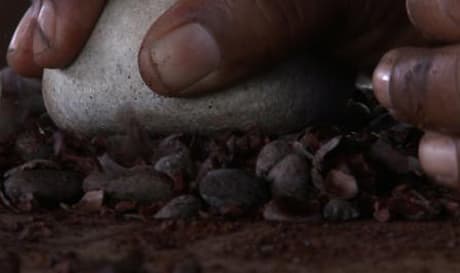Raising a half-dozen kids and making a living off the land in the ways of one's Mayan ancestors while trying to stay afloat in a modern, globalized world is difficult for a humble cacao bean farmer. Eladio Pop is one such man, a Belizean cacao farmer who farms those little beans and trades them on the market for a pittance compared to his industrial competitors. But making money is secondary to Eladio. As an aboriginal Mayan, he takes pride in doing it in the ways of his parents, his grandparents and the generations before them. Rohan Fernando's NFB doc shows a year in the life of this man, his farm, his family and their nearly outmoded way of life.
Rohan's camera captures the lush, unspoiled beauty of the Central American rainforest with the natural ease of Werner Herzog or even Terrence Malick. The pace is slow but elegant, contributing to a transcendental appreciation of the "New World," as Columbus would have seen it. (Well, actually, Belize was colonized by the British, so everyone mostly speaks Caribbean-accented English.)
The details of Eladio's daily activities are fascinating. With only a machete, he's able to cultivate his land, create pathways through the dense rainforest, cut down his cacao fruits and extract the mouth-watering goodness inside. Life is bliss when we see him sip sugar cane from vines and swim freely in the warm freshwater rivers. But life is also very hard for Eladio.
He's full of contradictions and for good and bad, director Rohan is clear not to pass judgment on his main character; we're never quite sure what to think of him. On the one hand, we admire the indigenous pride in his independence and his resolute determination not to lose his heritage. On the other, his stubbornness to accept the changing world order, specifically shutting down the dreams of his children to go to school, educate themselves and self-determine their fates in the world, feels irresponsible and short-sighted.
Fernando's unobtrusive, observational, even "polite" style makes this contradiction a little murky. These internal and external conflicts are never fully capitalized upon for cinematic effect. Fernando is too enamoured with Eladio to take him to task on the affect of his stubbornness on his family. Perhaps the Pops are content with their lives and everything's hunky-dory, but by the reactions of his children, there's a deep sense of discomfort, which Fernando never quite pulls out of them.
As a visual essay, or omniscient slice of life, which the old NFB used to do very well, The Chocolate Farmer succeeds, but as a dramatic, moving, emotionally insightful feature film competitive with the more successful theatrical documentaries of today, it unfortunately never reaches that level.
(NFB)Rohan's camera captures the lush, unspoiled beauty of the Central American rainforest with the natural ease of Werner Herzog or even Terrence Malick. The pace is slow but elegant, contributing to a transcendental appreciation of the "New World," as Columbus would have seen it. (Well, actually, Belize was colonized by the British, so everyone mostly speaks Caribbean-accented English.)
The details of Eladio's daily activities are fascinating. With only a machete, he's able to cultivate his land, create pathways through the dense rainforest, cut down his cacao fruits and extract the mouth-watering goodness inside. Life is bliss when we see him sip sugar cane from vines and swim freely in the warm freshwater rivers. But life is also very hard for Eladio.
He's full of contradictions and for good and bad, director Rohan is clear not to pass judgment on his main character; we're never quite sure what to think of him. On the one hand, we admire the indigenous pride in his independence and his resolute determination not to lose his heritage. On the other, his stubbornness to accept the changing world order, specifically shutting down the dreams of his children to go to school, educate themselves and self-determine their fates in the world, feels irresponsible and short-sighted.
Fernando's unobtrusive, observational, even "polite" style makes this contradiction a little murky. These internal and external conflicts are never fully capitalized upon for cinematic effect. Fernando is too enamoured with Eladio to take him to task on the affect of his stubbornness on his family. Perhaps the Pops are content with their lives and everything's hunky-dory, but by the reactions of his children, there's a deep sense of discomfort, which Fernando never quite pulls out of them.
As a visual essay, or omniscient slice of life, which the old NFB used to do very well, The Chocolate Farmer succeeds, but as a dramatic, moving, emotionally insightful feature film competitive with the more successful theatrical documentaries of today, it unfortunately never reaches that level.
